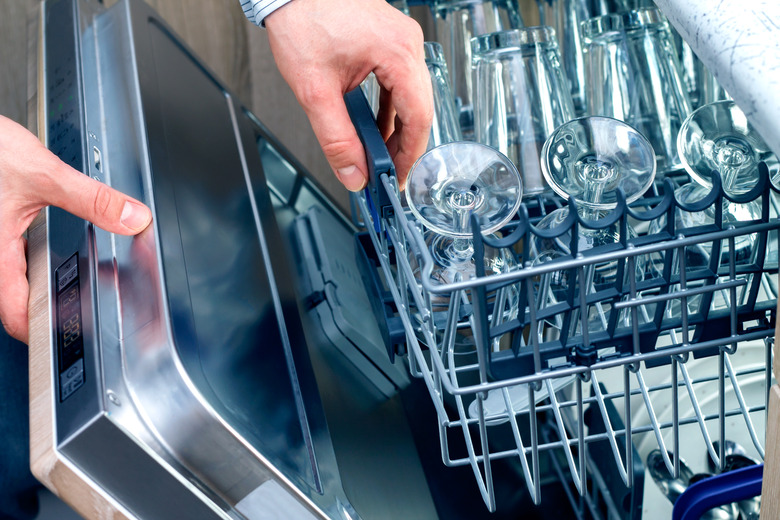How To Clean Cloudy Glasses From The Dishwasher
After all the effort of gathering them together, lining them up in the pronged plastic baskets and running them through the dishwasher clean cycle, it can be truly frustrating when they come out of the appliance with a coat of foggy film.
Cloudy glasses in a dishwasher are hugely annoying, but an easy fix. Depending on why the glasses are foggy, returning the cylinders to clean and clear glassware is a relatively simple endeavor.
A filmy cloud on glasses doesn't happen overnight. It is a slow process that shows up on the glasses and is more than likely also affecting the cutlery and dinnerware.
Water Issues that Create Foggy Glasses
Water Issues that Create Foggy Glasses
Before tackling and taking apart appliances or buying expensive cleaners, take a look at the water that cleans the glasses, cutlery, pots, pans and dinnerware. The glasses will show the first signs of issues with hard water from the lines that feed into the home.
To find out if it's the water that is creating that cloud on glasses, soak a hand-sized dish cloth in a small amount of household white vinegar. Wipe the glass down with the cloth. If the cloudy film dissipates after the initial or just a few wipes with the vinegar-soaked cloth, then it is more than likely a detergent that is causing the glasses to look so dirty.
If the glasses continue to look dirty after wiping down thoroughly with vinegar, you may have an issue with the water. Minerals and other deposits in the water from the tap that feeds into the dishwasher can cause pitting over time that will look like a film on the glasses and other dishes.
Dishwasher Limescale on Glasses
Dishwasher Limescale on Glasses
Cloudy glasses in a dishwasher could be due to the water in your area. Dishwasher limescale on glasses comes from the type of water that is being fed into the appliance.
If soft or hard water is an issue, then you may need to switch out the entire set of glassware. Continuing to put glasses in a dishwasher that uses soft water will only continue to offer up pitted and etched glassware.
Buy dishwasher-safe glasses to prevent a filmy cloud on glasses. If the dishwasher has cloudy cutlery, as well, then it more than likely is the water. The same type of cleaning detergents and homemade remedies can be used to clean the cutlery. Another option is to buy dishwasher-safe silverware.
Tips and Tricks for Crystal Clear Glasses
Tips and Tricks for Crystal Clear Glasses
You can do a few things to prevent dishwasher scum on glasses and ensure gleaming dinnerware after each cycle.
Immediately after the dishwasher has ended its washing and drying cycle, and it is still hot on the inside of the cabinet, open the door and allow the steam to escape. Let the glasses to cool before you remove them to keep them film-free
When dishwasher scum on glasses builds up, it's a sign that the dishwasher itself may need a thorough cleaning. Remove all filters, and unscrew cover plates and arms where you can. With a cotton swab dipped in vinegar or rubbing alcohol, clean all nooks and crannies, and swipe the edges and entrance to the water holes on the spinning arms.
Add a cup of vinegar to the dishwasher before running it. This won't affect the ceramic dishes or general use eating utensils and dinnerware. You can also use a citrus-based cleaning agent once a week to clean out the arms and filters. Place the cleaning tab at the bottom of the dishwasher tub and run it empty on the cleaning or quick washing cycle.
